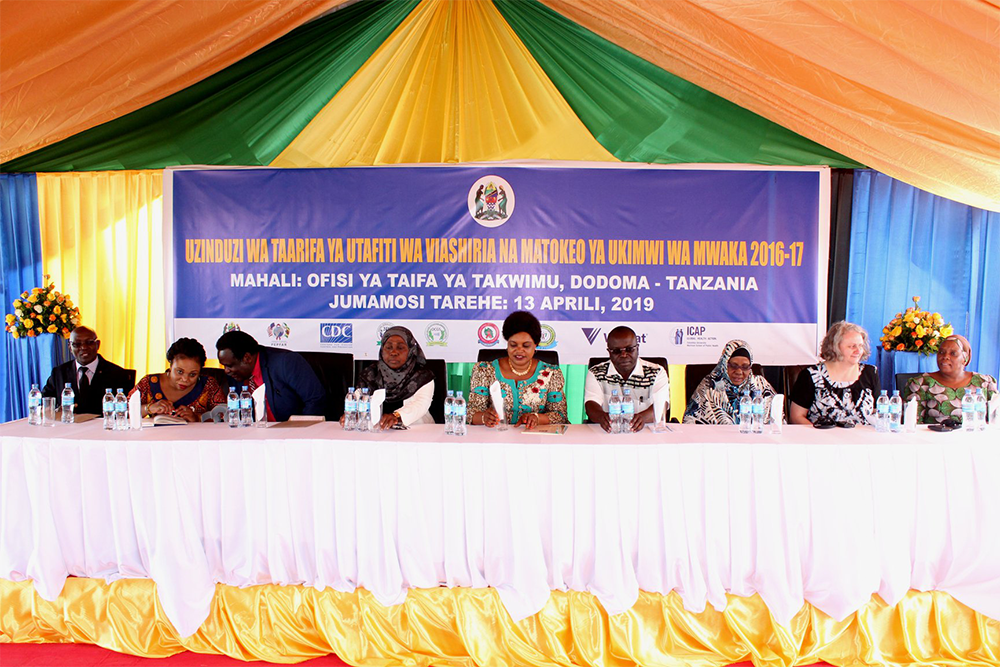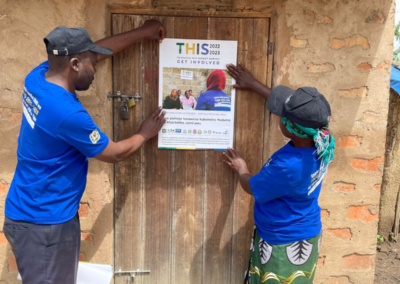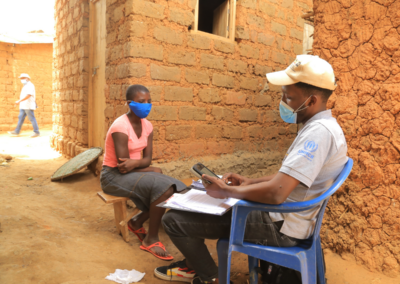
Tanzania HIV Impact Survey Launch on April 13, 2019 in Dodoma, Tanzania
Tanzania, which has been one of the countries at the epicenter of the HIV epidemic in sub-Saharan Africa, now has a critical set of data about its progress in addressing HIV among its people – and equally critical insight into the work that still lies ahead.
On April 13, 2019, officials gathered in the Tanzanian capital, Dodoma, to announce the final results of the Tanzania HIV Impact Survey (THIS) 2016-17. The survey, which is part of the multi-country Population-based HIV Impact Assessment (PHIA), was conducted by ICAP at Columbia University in partnership with the Government of Tanzania through the Tanzania Commission for AIDS (TACAIDS) and Zanzibar AIDS Commission (ZAC), funding from the US President’s Emergency Plan for AIDS Relief (PEPFAR) and technical assistance from the U.S. Centers for Disease Control (CDC). THIS provides an important new reference point in Tanzania’s march toward epidemic control within its borders and the global response to HIV at large.
In Tanzania, THIS was conducted between October 2016 – August 2017. It surveyed over 14,000 households and interviewed more than 33,000 adults (15 and older) and 10,000 children (14 and younger). The results provide extensive data on the number of people living with HIV in Tanzania (prevalence), number of new HIV infections occurring each year (incidence) and use of health services by people living with HIV.
At the event, the Minister of State in the Prime Minister’s Office responsible for Parliament, Policy Coordination, Labour, Employment, Youth and the Disabled, Jenista Mhagama, stressed the importance of using the THIS report to inform future HIV program implementation. “The main objectives from the results of THIS 2016-2016, apart from other interventions, is to prevent new HIV infections – for those who are HIV-negative to remain negative – and those found to be HIV positive to be enrolled into care and start ART immediately,” Minister Mhagama said.
Key findings from the report reveal that 5.0% of adults (15-64 years) in Tanzania are currently living with HIV. A large percentage of these adults – nearly 40% – are unaware of their positive status, well-below the UNAIDS target of 90% of all people living with HIV knowing their status by 2020. Conversely, there has been progress in adults living with HIV who are aware of their status, with 93.6% receiving anti-retroviral therapy (ART) and 87.0% of those on ART having viral load suppression.
Minister Mhagama also urged those working on HIV programming to encourage people to volunteer for HIV testing, provide counselling for those found to be living with HIV, and address HIV-related stigma and discrimination.
At the event, the Tanzania Commission for AIDS’ (TACAIDS) Executive Director, Dr. Leonard Maboko, encouraged policy makers, planners and stakeholders to use the report findings to make informed HIV policy decisions.
“The findings furnish the government, key health stakeholders and the general public with official statistics for use in planning, policy making, monitoring and evaluating programs on HIV,” stated Dr. Maboko.
After the report’s release, the National Council of People living with HIV and AIDS (NACOPHA) announced that the results will be used to design awareness campaigns on prevention, medication and stigma for people living with HIV in Tanzania.
For additional information and access to the final report, visit: phia.icap.columbia.edu/countries/Tanzania
THIS was led by the Government of Tanzania through the Tanzania Commission for AIDS (TACAIDS) and Zanzibar AIDS Commission (ZAC), and the Ministry of Health, Community Development, Gender, Elderly and Children (MoHCDGEC), the Ministry of Health Zanzibar (MoH), National Bureau of Statistics (NBS) and the Office of Chief Government Statistician (OCGS). THIS was conducted with funding from the U.S. President’s Emergency Plan for AIDS Relief (PEPFAR) and technical assistance through the U.S. Centers for Disease Control and Prevention (CDC) and ICAP at Columbia University.









